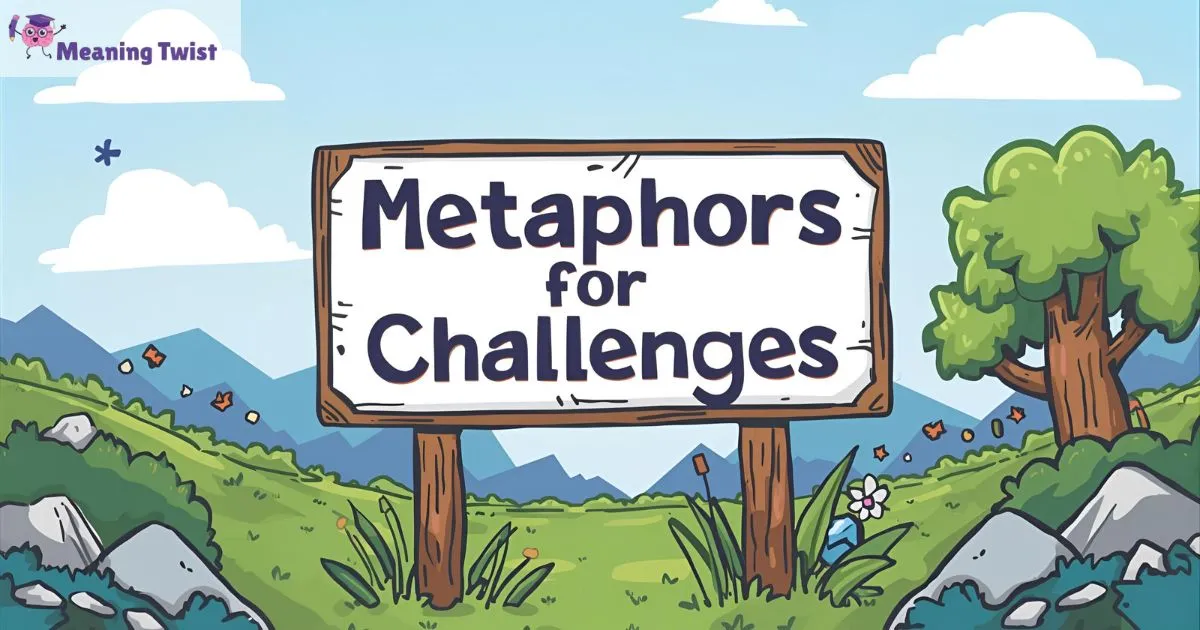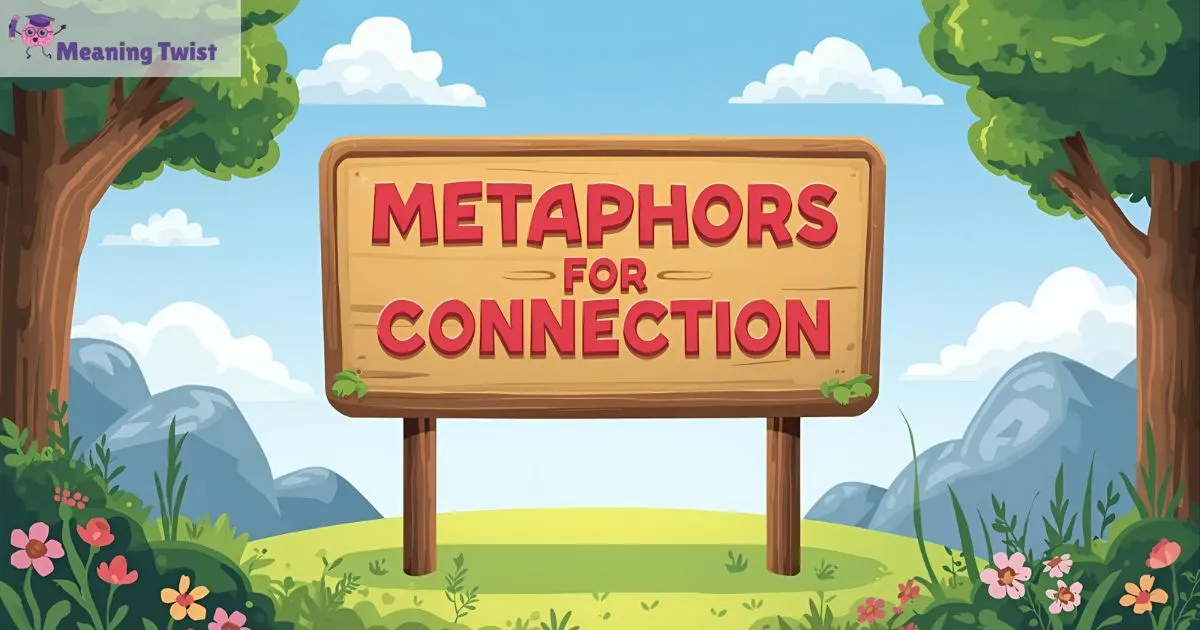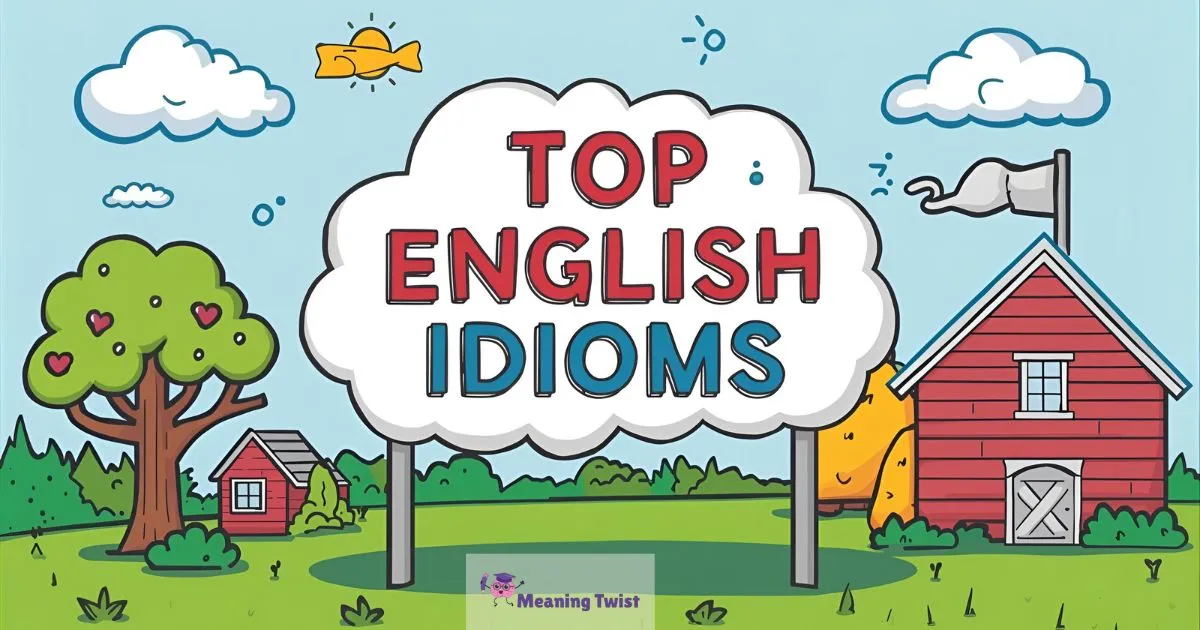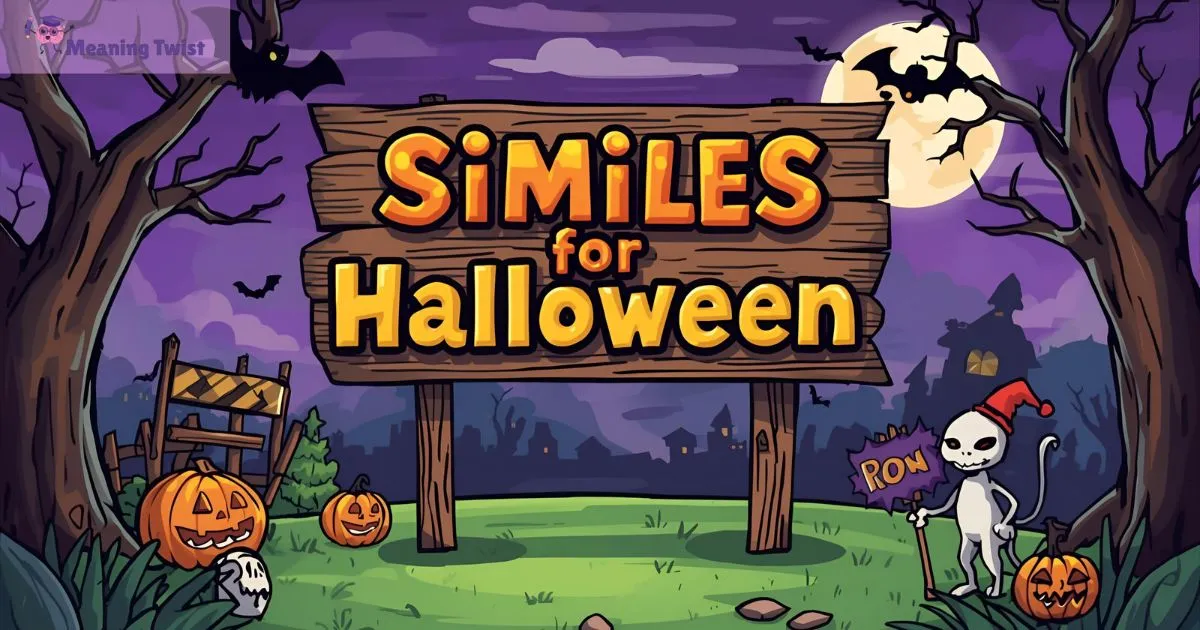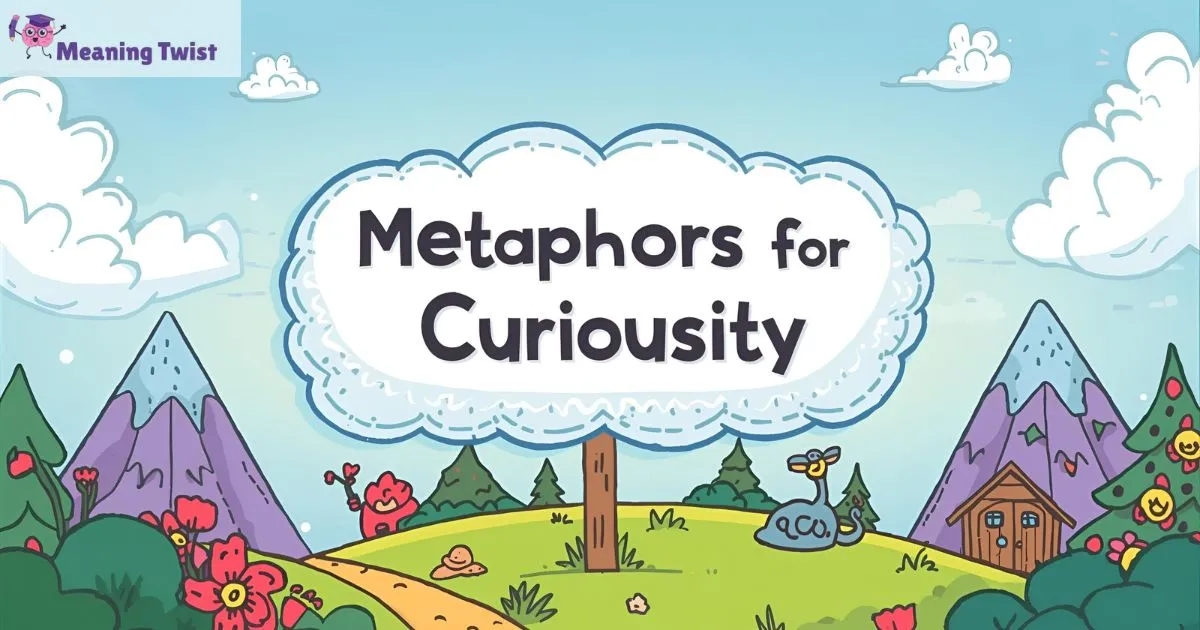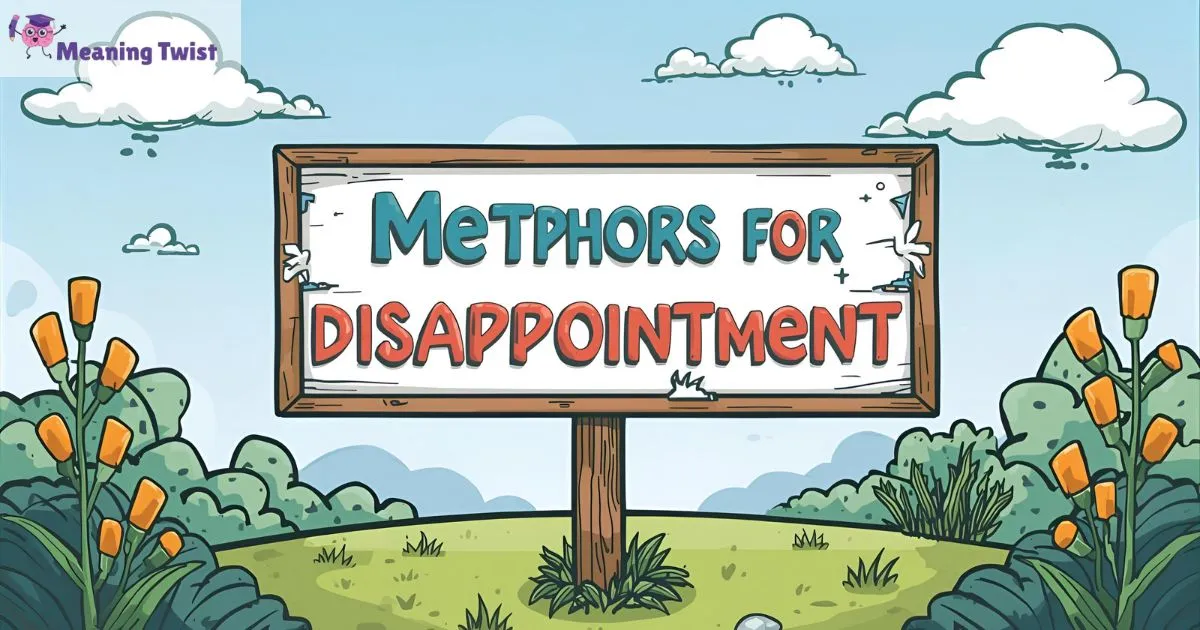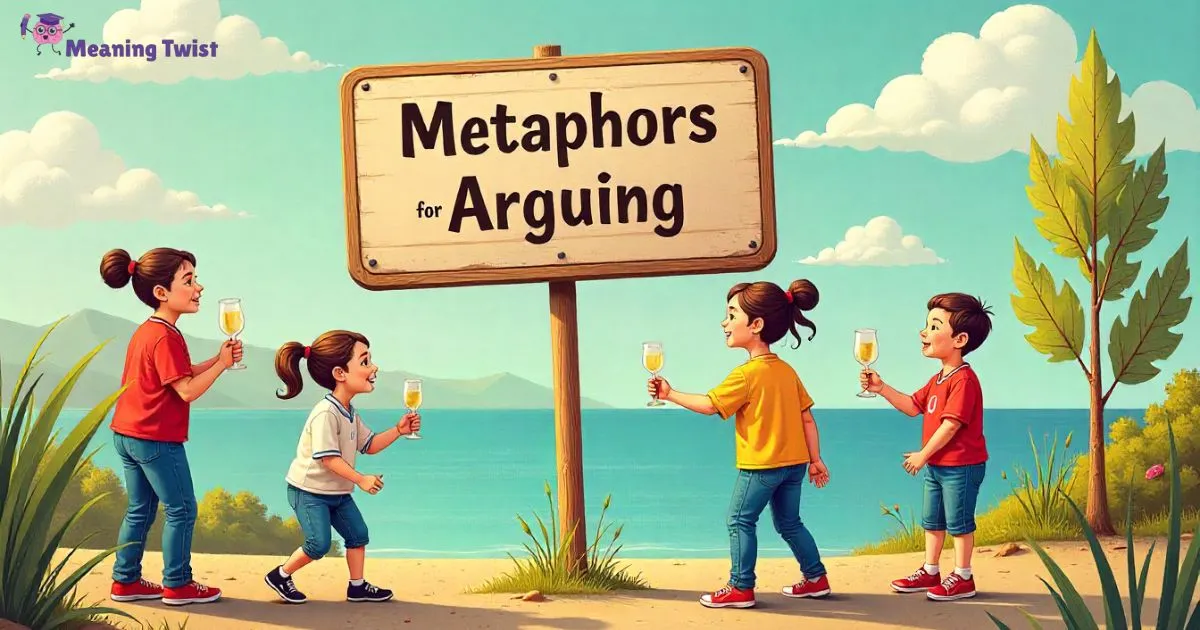
Metaphors for Arguing often make people pause and wonder, “Why do we compare a fight to a storm or fireworks?” Idioms are short, creative phrases that don’t always mean exactly what the words say. Instead, they act like little stories, helping us describe feelings, emotions, or situations in a way that feels alive and full of energy.
When people argue, it’s not just about words, it can feel like clashing thunder, rising heat, or even a tug-of-war. Take the idiom “a storm brewing,” for example. It doesn’t mean real rain is coming; it means tension is building, and a big fight might soon explode. This kind of figurative language makes conversations more colorful and helps us understand emotions without spelling them out directly.
By learning different metaphors for arguing, you’ll discover playful, dramatic, and expressive ways to talk about conflict and turn everyday English into something vivid and memorable.
Metaphors for Arguing
1. A Storm Brewing
Meaning
This idiom means a fight or argument is about to start, just like when dark clouds show a storm is coming.
When to Use It
Use this when people are getting upset, and you can feel that trouble is on the way.
In a Sentence
- I could tell a storm was brewing when my friends started shouting.
- He knew a storm was brewing when his sister crossed her arms.
- They saw a storm brewing in the classroom after the kids disagreed.
Other Ways to Say
- Trouble is coming
- Things are heating up
- Trouble in the air
Fun Tip or Visual Clue
Think of big gray clouds rolling in before heavy rain. That’s how arguments often feel—loud and stormy.
2. Fireworks Going Off
Meaning
This idiom shows that an argument is loud, bright, and full of strong feelings, just like fireworks exploding in the sky.
When to Use It
Say this when two people are shouting or when the fight feels explosive and quick.
In a Sentence
- I felt like fireworks were going off when I argued with my brother.
- She thought fireworks were going off when her friends yelled at each other.
- They saw fireworks going off during the team meeting.
Other Ways to Say
- Explosive fight
- Sparks flying
- Big blow-up
Fun Tip or Visual Clue
Imagine the crack, boom, and bright colors of fireworks. That’s what arguments can sound and feel like.
3. A Tug of War
Meaning
This idiom means people are pulling in different directions in an argument, like the game tug of war with a rope.
When to Use It
Use this when two people want totally different things and refuse to give up.
In a Sentence
- I felt like I was in a tug of war with my mom over bedtime.
- He thought it was a tug of war when he and his dad picked a movie.
- They were in a tug of war about where to go for lunch.
Other Ways to Say
- Pulling in opposite directions
- Power struggle
- Standoff
Fun Tip or Visual Clue
Picture two teams pulling hard on a rope. Neither wants to let go—that’s just like a strong argument.
4. A Volcano Erupting
Meaning
This idiom means someone’s anger bursts out suddenly, like lava exploding from a volcano.
When to Use It
Use it when someone holds in anger for a long time and finally shouts or cries.
In a Sentence
- I felt like a volcano erupting when I couldn’t stay calm anymore.
- She looked like a volcano erupting during the argument.
- They were like a volcano erupting when things went too far.
Other Ways to Say
- Anger exploding
- Blowing up
- Losing control
Fun Tip or Visual Clue
Think of lava rushing out of a mountain. That’s what an angry outburst can feel like.
5. Two Trains Colliding
Meaning
This idiom means two people or groups crash into each other with their ideas, just like trains on the same track.
When to Use It
Use this when both sides refuse to move or agree, and the fight feels strong.
In a Sentence
- I felt like two trains colliding when my team argued with the other group.
- He thought it was like two trains colliding when his parents fought.
- They saw two trains colliding during the debate.
Other Ways to Say
- Head-on clash
- Major crash
- Full collision
Fun Tip or Visual Clue
Picture two trains speeding fast toward each other. That’s how arguments can smash together.
6. A Broken Record
Meaning
This idiom means someone keeps saying the same thing over and over, just like a scratched music record repeating.
When to Use It
Use this when an argument goes in circles and nothing new is said.
In a Sentence
- I felt like a broken record when I repeated my reason again and again.
- He sounded like a broken record telling his sister to stop.
- They acted like a broken record in the meeting.
Other Ways to Say
- Repeating endlessly
- Stuck on repeat
- Going in circles
Fun Tip or Visual Clue
Think of a song stuck on one line, playing again and again—that’s how arguments can feel.
7. Lightning Striking
Meaning
This idiom means anger or arguments happen suddenly, like a flash of lightning.
When to Use It
Use this when people get angry very quickly without warning.
In a Sentence
- I felt like lightning was striking when my brother yelled at me so fast.
- She thought it was like lightning striking when her friend snapped at her.
- They argued like lightning striking out of nowhere.
Other Ways to Say
- Sudden anger
- Quick spark
- Flash fight
Fun Tip or Visual Clue
Picture a bright bolt flashing across the sky. That’s how sudden arguments can appear.
8. A Boiling Pot
Meaning
This idiom means someone’s anger is building up inside, just like water boiling in a pot.
When to Use It
Use this when someone is quiet but looks like they are about to explode.
In a Sentence
- I felt like a boiling pot when I kept my feelings inside.
- He looked like a boiling pot ready to spill over.
- They were like a boiling pot during the class fight.
Other Ways to Say
- Ready to burst
- About to boil over
- Holding in anger
Fun Tip or Visual Clue
Imagine water bubbling louder and louder until it spills—that’s how built-up anger feels.
9. Like Cats and Dogs
Meaning
This idiom means two people fight often, just like cats and dogs are known to fight.
When to Use It
Use this when friends or siblings argue almost every day.
In a Sentence
- I argued like cats and dogs with my sister yesterday.
- He and his brother fight like cats and dogs all the time.
- They were like cats and dogs in the group project.
Other Ways to Say
- Constant fighting
- Always at odds
- Never agreeing
Fun Tip or Visual Clue
Think of a barking dog and a hissing cat—they just can’t get along.
10. A Thunderstorm
Meaning
This idiom means an argument is loud and scary, like thunder rumbling in the sky.
When to Use It
Use this when a fight feels big and noisy.
In a Sentence
- I felt like I was stuck in a thunderstorm during the argument.
- She thought it was a thunderstorm when her parents shouted.
- They were in a thunderstorm of words in class.
Other Ways to Say
- Loud clash
- Storm of anger
- Big blow-up
Fun Tip or Visual Clue
Imagine thunder booming and rain pouring down—that’s how loud fights can sound.
11. A Wild Fire
Meaning
This idiom means anger spreads quickly, just like a fire running through a forest.
When to Use It
Use this when one person’s anger makes everyone else upset too.
In a Sentence
- I felt like a wildfire when my anger spread to my friends.
- He started a wildfire of arguments at the party.
- They saw a wildfire of anger spread in the group chat.
Other Ways to Say
- Anger spreading fast
- Out of control
- Spreading fight
Fun Tip or Visual Clue
Think of dry grass catching fire and spreading everywhere—arguments can grow like that too.
12. An Iceberg
Meaning
This idiom means most of the problem is hidden, just like most of an iceberg is underwater.
When to Use It
Use this when an argument seems small but has a bigger problem underneath.
In a Sentence
- I knew it was an iceberg when my friend argued about something small.
- She thought the fight was like an iceberg with hidden feelings.
- They argued over an iceberg problem in their friendship.
Other Ways to Say
- Hidden trouble
- More than it seems
- Underneath the surface
Fun Tip or Visual Clue
Picture the small tip of ice above water and the huge piece below—arguments can be like that.
13. A Game of Ping-Pong
Meaning
This idiom means two people keep tossing words back and forth, like a ping-pong ball.
When to Use It
Use this when people keep replying quickly in an argument.
In a Sentence
- I felt like I was in a ping-pong game when I kept answering back.
- He thought it was a ping-pong game when his friend argued with him.
- They were like a ping-pong game during the meeting.
Other Ways to Say
- Back-and-forth
- Word tossing
- Quick replies
Fun Tip or Visual Clue
Imagine a ball bouncing fast between two players—that’s how arguments can go back and forth.
Read More: Metaphors for Attraction That Give You All the Feels
14. A Bomb Going Off
Meaning
This idiom means an argument happens suddenly and with a big impact, like an explosion.
When to Use It
Use this when calm turns to anger very fast.
In a Sentence
- I felt like a bomb went off when I yelled without warning.
- She looked like a bomb went off during the test fight.
- They argued like a bomb going off in the room.
Other Ways to Say
- Big blow-up
- Huge burst
- Sudden explosion
Fun Tip or Visual Clue
Picture a loud, unexpected boom—that’s how surprising some fights can be.
15. A Tornado
Meaning
This idiom means an argument is wild and spins out of control, like a tornado.
When to Use It
Use this when fights are messy and confusing.
In a Sentence
- I felt like a tornado when I argued with my friend.
- He saw a tornado of shouting in the classroom.
- They argued like a tornado of words.
Other Ways to Say
- Spinning chaos
- Wild fight
- Out of control
Fun Tip or Visual Clue
Picture a tornado twisting through a town—that’s how messy fights can feel.
16. A Rock and a Hard Place
Meaning
This idiom means being stuck in the middle of an argument with no easy choice.
When to Use It
Use this when both options feel bad during a disagreement.
In a Sentence
- I felt stuck between a rock and a hard place when I had to pick sides.
- He thought he was between a rock and a hard place with his parents.
- They felt like a rock and a hard place during the group fight.
Other Ways to Say
- No good choice
- Trapped in the middle
- Difficult spot
Fun Tip or Visual Clue
Imagine being squeezed between two giant rocks with no room to move—that’s how this feels.
17. Sparks Flying
Meaning
This idiom means energy and anger burst out, like sparks from fire.
When to Use It
Use this when people argue quickly and strongly.
In a Sentence
- I saw sparks flying when my friends disagreed.
- She felt sparks flying in the middle of the fight.
- They had sparks flying during the game.
Other Ways to Say
- Energy clash
- Quick anger
- Heated moment
Fun Tip or Visual Clue
Picture tiny sparks jumping off a campfire—that’s what angry words can look like.
18. Like a Car Crash
Meaning
This idiom means a fight is loud and shocking, just like a car crash.
When to Use It
Use this when an argument feels sudden and very big.
In a Sentence
- I felt like a car crash when I shouted at my brother.
- He thought the fight was like a car crash—loud and messy.
- They argued like a car crash during lunch.
Other Ways to Say
- Big crash
- Shocking mess
- Loud accident
Fun Tip or Visual Clue
Picture cars colliding with a bang—that’s how fights can feel.
19. A Pressure Cooker
Meaning
This idiom means anger builds up inside until it bursts out, like steam in a cooker.
When to Use It
Use this when someone stays quiet too long but then suddenly explodes.
In a Sentence
- I was like a pressure cooker when I finally shouted.
- He looked like a pressure cooker in the meeting.
- They were a pressure cooker ready to burst.
Other Ways to Say
- About to pop
- Building pressure
- Holding it in
Fun Tip or Visual Clue
Think of steam hissing out of a cooker—that’s anger escaping too fast.
20. A Bee Hive
Meaning
This idiom means arguments can be buzzing and busy, like bees in a hive.
When to Use It
Use this when many people are arguing at once.
In a Sentence
- I felt like I was in a beehive when everyone yelled together.
- He thought the classroom was like a beehive of noise.
- They argued in a beehive of buzzing voices.
Other Ways to Say
- Loud buzz
- Busy fight
- Full of noise
Fun Tip or Visual Clue
Imagine bees buzzing all around—that’s what loud group fights sound like.
21. A Game of Chess
Meaning
This idiom means an argument is careful and strategic, like playing chess.
When to Use It
Use this when people argue with smart words instead of shouting.
In a Sentence
- I felt like I was in a chess game during the debate.
- He played it like chess, planning every word.
- They were in a chess game of ideas.
Other Ways to Say
- Strategic fight
- Careful moves
- Thoughtful battle
Fun Tip or Visual Clue
Picture chess pieces moving slowly but smartly—that’s like a clever argument.
22. A Wall
Meaning
This idiom means someone refuses to listen, just like talking to a wall.
When to Use It
Use this when you argue but the other person won’t change.
In a Sentence
- I felt like I was talking to a wall when I argued with him.
- She thought her brother was a wall during their fight.
- They argued with a wall of silence.
Other Ways to Say
- Not listening
- Blocked off
- Silent barrier
Fun Tip or Visual Clue
Imagine shouting at a brick wall—it doesn’t answer back.
23. A Roller Coaster
Meaning
This idiom means arguments go up and down in feelings, like a roller coaster ride.
When to Use It
Use this when fights feel exciting one moment and scary the next.
In a Sentence
- I felt like a roller coaster in the middle of our argument.
- He thought the fight was a roller coaster of emotions.
- They argued on a roller coaster of words.
Other Ways to Say
- Ups and downs
- Twists and turns
- Emotional ride
Fun Tip or Visual Clue
Picture going up and down on a roller coaster—that’s how feelings move in arguments.
24. A Chess Match
Meaning
This idiom also means an argument is like chess, but it focuses on two smart players battling.
When to Use It
Use this when both sides think carefully before speaking.
In a Sentence
- I felt like I was in a chess match with my teacher’s questions.
- He argued like a chess match, planning every step.
- They were in a chess match of ideas.
Other Ways to Say
- Strategic battle
- Brain fight
- Careful contest
Fun Tip or Visual Clue
Think of two players staring at the board, thinking hard—that’s what smart arguments are like.
25. A Spinning Top
Meaning
This idiom means arguments go round and round without stopping, like a spinning toy top.
When to Use It
Use this when no one wins the fight and it just keeps going.
In a Sentence
- I felt like a spinning top during our endless fight.
- He thought it was a spinning top when no one stopped arguing.
- They went like a spinning top around and around.
Other Ways to Say
- Endless circle
- Round and round
- Going nowhere
Fun Tip or Visual Clue
Picture a top spinning in place—that’s what repeated fights look like.
26. A Melting Ice Cube
Meaning
This idiom means anger slowly fades away, just like ice melting.
When to Use It
Use this when people calm down after a fight.
In a Sentence
- I felt like a melting ice cube when I cooled down after shouting.
- He was like a melting ice cube after the fight ended.
- They were melting ice cubes when the anger left.
Other Ways to Say
- Cooling off
- Anger fading
- Settling down
Fun Tip or Visual Clue
Imagine an ice cube shrinking until it’s gone—that’s how anger melts away.
27. A Puppet Show
Meaning
This idiom means people argue while someone else controls them, like puppets.
When to Use It
Use this when people fight only because someone else pushed them.
In a Sentence
- I felt like a puppet show when I argued because of my friend.
- He was in a puppet show during the fight his brother started.
- They acted like a puppet show in the group project.
Other Ways to Say
- Being controlled
- Pulled by strings
- Not in charge
Fun Tip or Visual Clue
Picture puppets moving with strings—that’s how people can be in fights too.
28. A Mirror Cracking
Meaning
This idiom means a fight breaks trust, just like cracks breaking glass.
When to Use It
Use this when an argument hurts a friendship.
In a Sentence
- I felt like a mirror cracking when I argued with my best friend.
- She saw their friendship as a mirror cracking during the fight.
- They felt the mirror crack in their team.
Other Ways to Say
- Trust breaking
- Friendship cracking
- Relationship damage
Fun Tip or Visual Clue
Think of glass cracking—it doesn’t go back to normal easily.
29. A Drum Beating
Meaning
This idiom means an argument keeps going with loud rhythm, like a drumbeat.
When to Use It
Use this when fights feel steady and won’t stop.
In a Sentence
- I felt like a drum was beating during the long argument.
- He thought it was a drum beating in the background of class.
- They argued like a drum beating over and over.
Other Ways to Say
- Loud rhythm
- Repeating sound
- Never-ending noise
Fun Tip or Visual Clue
Picture someone hitting a drum again and again—that’s what ongoing fights sound like.
30. A Game of Hot Potato
Meaning
This idiom means people pass blame around quickly, just like tossing a hot potato.
When to Use It
Use this when no one wants to take responsibility in a fight.
In a Sentence
- I felt like I was in a hot potato game when we blamed each other.
- He passed the blame like hot potato during the project.
- They were in a hot potato fight about chores.
Other Ways to Say
- Passing blame
- Tossing problems
- Not owning up
Fun Tip or Visual Clue
Think of kids tossing a hot potato fast so they don’t get burned—that’s how blame moves in fights.
Exercise to Practice Metaphors for Arguing
- When Mia and her brother argued, it felt like ________, shaking the whole house.
- The classroom debate was so loud, it sounded like ________ in the sky.
- Every time Max and Ella argued, it was like ________, each one pulling harder.
- Their shouting match was like ________, sparks flying everywhere.
- When Zoe lost her patience, it was like ________, bubbling over.
- The argument at lunch felt like ________, with strong winds spinning around.
- When Dad and Uncle Tom argued about football, it was like ________, neither slowing down.
- Sara kept repeating the same point, sounding like ________.
- The fight between the twins was like ________, fierce and constant.
- When the two leaders clashed, it was like ________, both rushing toward each other.
- Lily’s sudden anger was like ________, fast and shocking.
- After the joke turned serious, their tempers lit up like ________, spreading quickly.
- The fight during the group project was like ________, back and forth, back and forth.
- When Mark yelled, it was like ________, loud and explosive.
- Their anger kept building until it was like ________, too hot to stop.
✅ Answer Key
- A Storm Brewing
- A Thunderstorm
- A Tug of War
- Fireworks Going Off
- A Boiling Pot
- A Tornado
- Two Trains Colliding
- A Broken Record
- Like Cats and Dogs
- A Volcano Erupting
- Lightning Striking
- A Wild Fire
- A Game of Ping-Pong
- A Bomb Going Off
- An Iceberg
Why are metaphors for arguing helpful in everyday conversations?
Metaphors for Arguing can turn tense moments into more relatable and creative expressions in everyday conversations. Instead of saying “we had a fight,” you might describe it as “a storm brewing” or “fireworks going off.”
These figurative language tools help paint vivid pictures, soften harsh tones, and make conflicts easier to talk about. By using idioms, similes, and symbolic phrases, you can express emotions in a way that feels lighter, more human, and even humorous, helping others connect with your feelings without escalating the argument.
Final Words
You’re not alone if you’ve ever felt stuck finding the right words during a heated moment. That’s where metaphors for arguing can really help. These simple yet powerful expressions turn tricky emotions into pictures we can all understand, whether at school, home, or with friends.
They make conversations lighter, clearer, and even a little fun. Next time you’re feeling this way, you’ll know exactly what to say! Keep exploring idioms, practice them often, and watch your confidence in speaking and writing grow stronger every day.

Hi, I am Joey, the admin of meaningtwist.com. I simplify deep meanings and twist ordinary words into extraordinary insights to spark your curiosity and clicks!

